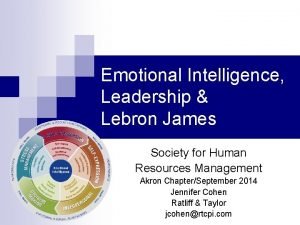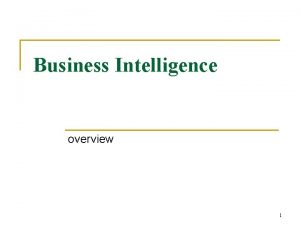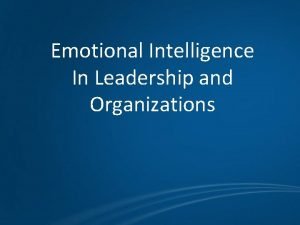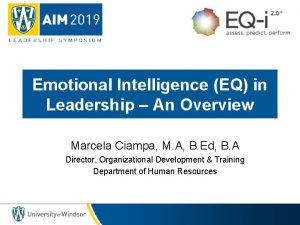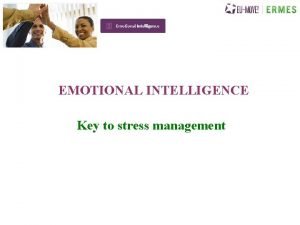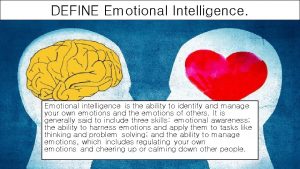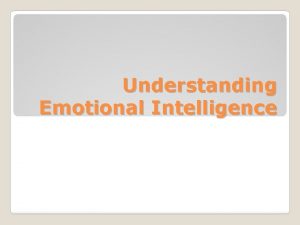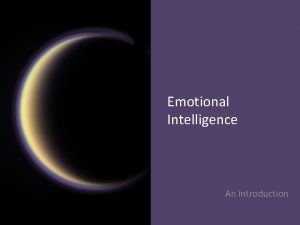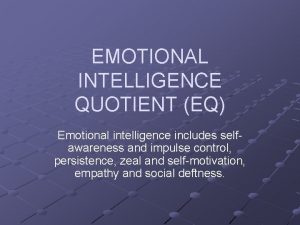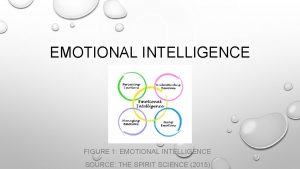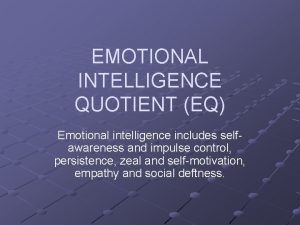Emotional Intelligence EQ in Leadership An Overview Marcela





















- Slides: 21

Emotional Intelligence (EQ) in Leadership – An Overview Marcela Ciampa, M. A, B. Ed, B. A Director, Organizational Development & Training Department of Human Resources

Warm-up Activity Think about a leader that you admire. Go to www. menti. com to record the traits that make them a great leader.

Great Leaders… • Lead by example, inspiring those around them, not afraid of challenges, they are focused and driven (motivation) • Are confident, honest, direct and consistent (selfawareness) • Are clear, decisive, straight forward, intuitive (selfregulation) • Are good communicators, approachable and listen to others (social skills) • Are empathetic, influential (empathy) Great leaders demonstrate these traits through the words that they use and their actions which result from their high degree of emotional intelligence.

What is Emotional Intelligence? • EI is not the same as IQ, cognitive ability, aptitude, or personality. • Emotional intelligence is a set of emotional and social skills that collectively establish how well we: • • Perceive and express ourselves Develop and maintain social relationships Cope with challenges Use emotional information in an effective and meaningful way Source: Multi-Health Systems

The EQ-i 2. 0 Model This is one of the models used to describe the skills/competencies associated with Emotional Intelligence. • • Circular 5 composite scales 15 sub-scales All are interconnected and interdependent

Emotional Intelligence in Leadership • People with a high degree of emotional intelligence know – What they are feeling – What their emotions mean – How their emotions can affect other people For leaders, having emotional intelligence is critical for success. From your perspective, who would be a more effective leader…. 1. A leader who shouts at their team when under stress. 2. A leader who stays in control of their emotions under stress and calmly assesses the situation.

Emotional Intelligence in Leadership • When you are in a leadership role, reacting emotionally can have a negative impact that ripples through a department/organization/ group. • We all have the ability to become more effective by understanding and strengthening our emotional intelligence. Have you ever caught yourself thinking… • Why did I just say that? • I didn’t handle that discussion as well as I could have.

Why is EI a Critical Leadership Skill? • One of the primary roles of leaders is to inspire, motivate and support their teams. • To be effective, leaders must have a strong understanding of how their emotions and actions impact their teams. • Leaders who have well developed emotional and social skills are able to effectively manage the interactions resulting in improved relationships, enhanced trust, more collegiate team culture and higher performance. In 2016, the World Economic Forum identified Emotional Intelligence as one of the top 10 skills that individuals would need to thrive in 2020.

Overview of the EQ-i 2. 0 ® Model of Emotional Intelligence • 5 composite scales • 15 sub-scales • All are interconnected and interdependent Five composite scales: • Self-Perception – understanding your emotions • Self-Expression – expressing your emotions • Interpersonal – developing and maintaining relationships • Decision Making – using emotions to make better decisions • Stress Management – coping with challenges Copyright © 2011 Multi-Health Systems Inc. All rights reserved. Based on the Bar-On EQ-i model by Reuven Bar-On. Copyright 1997. Source: Multi-Health Systems

Self-Perception Consists of the following subcategories: • Self-Regard – confidence • Self-Actualization – continuous development • Emotional Self-Awareness – understanding your emotions Source: Multi-Health Systems

Self-Expression Consists of the following: • Emotional Expression – saying how you feel • Assertiveness – standing up for yourself effectively • Independence – standing on your own two feet Source: Multi-Health Systems

Interpersonal Consists of the following: • Interpersonal Relationships – developing and maintaining good relationships • Empathy – recognizing and appreciating how others feel • Social Responsibility – contributing to society Source: Multi-Health Systems

Decision Making Consists of the following: • Problem Solving – effectively managing emotions when solving problems • Reality Testing – seeing things as they really are • Impulse Control – resisting or delaying impulses Source: Multi-Health Systems

Stress Management Consists of the following: • Flexibility – adapting to change effectively • Stress Tolerance – successfully coping with stressful situations • Optimism – having a positive outlook Source: Multi-Health Systems

Activity – Emotional Intelligence in Action Go to menti. com Source: This activity has been extrapolated from the following presentation for the purposes of illustrating EQ for educational purposes: CDHS/Research Foundation of SUNY/BSC. Emotional Intelligence: How Your Emotions Influence Your Life at Work and at Home retrieved from www. bsc-cdhs. org.

What Can You Do to Develop your EI? • Choosing to improve your EI is about behaviour change. • Behaviour change: – is hard work – takes time, energy and a strong commitment to becoming a more emotionally effective leader

What Can You Do to Develop your EI? 1. Review the EQ-i 2. 0 model and identify your strengths and areas for enrichment 2. Reflect on your emotional reactions to situations 3. Ask others for perspective 4. Be observant 5. Use “the pause” 6. Explore the “why” 7. When criticized, don’t take offence, instead ask “what can I learn? ” 8. Practice, practice Source: Justin Bariso. How to Increase Your Emotional Intelligence. Retrieved from https: //www. inc. com

Examples • Practicing Self-Awareness: – Learn to “tune-in” to your emotions – they can give you valid information about your responses to stressful situations. • Practicing Self-Regulation: – Accept responsibility for choosing your own emotional responses. – Be aware of your “triggers” and learn to manage them.

Examples • Practicing self-motivation – Recognize that emotions affect your performance – When you experience a setback, resist asking “what’s wrong with me? ” Instead, ask “how can I improve? ” • Practicing empathy – Recognize and respond appropriately to the emotions of others.

Comments? Thoughts? Questions?

Resources Consulted Multi-Health Systems. EQ-i 2. 0 Model and the following resources: • Module 1: Overview of Emotional Intelligence and the EQ-I 2. 0 Model • Module 2: The Science Behind the EQ-I 2. 0 • Appendix A Subscale Definitions Articles retrieved from websites • CDHS/Research Foundation of SUNY/BSC. Emotional Intelligence: How Your Emotions Influence Your Life at Work and at Home retrieved from www. bsc-cdhs. org. • Justin Bariso. How to Increase Your Emotional Intelligence. Retrieved from https: //www. inc. com • The Neuroscience of Emotional Intelligence. Retrieved from https: //www. inc. com/travis-bradberry. • Linda Allen-Hardisty, Queen's IRC Facilitator. Emotional Intelligence: How Leaders Can Use it to Their Advantage. Retrieved from https: //irc. queensu. ca • 6 Q Blog. The Importance of Emotional Intelligence in Leadership. Retrieved from https: //inside. 6 q. io • The Management Centre. Emotional Intelligence in Leadership. Retrieved from https: //www. managementcentre. co. uk • World Economic Forum. One of the top ten skills that you will need thrive in the fourth industrial revolution. Retrieved from https: //www. weforum. org
 Global leadership foundation emotional intelligence test
Global leadership foundation emotional intelligence test Areanna ai
Areanna ai Business intelligence overview
Business intelligence overview Marcela fejtová
Marcela fejtová Marcela pulido
Marcela pulido Marcela donoso
Marcela donoso Marcela sarmiento
Marcela sarmiento Marcela jimenez hot
Marcela jimenez hot Marcela bernal
Marcela bernal Marcela ruz
Marcela ruz Marcela elizalde
Marcela elizalde Marcela saeb lima
Marcela saeb lima Marcela boni evangelista
Marcela boni evangelista Dermatopatologa
Dermatopatologa Higgs singlet
Higgs singlet Marcela boni evangelista
Marcela boni evangelista Marcela carena
Marcela carena Ing. marcela pavlová
Ing. marcela pavlová Marcela botero
Marcela botero Marcela boni evangelista
Marcela boni evangelista Marcela donoso
Marcela donoso Dcl
Dcl
